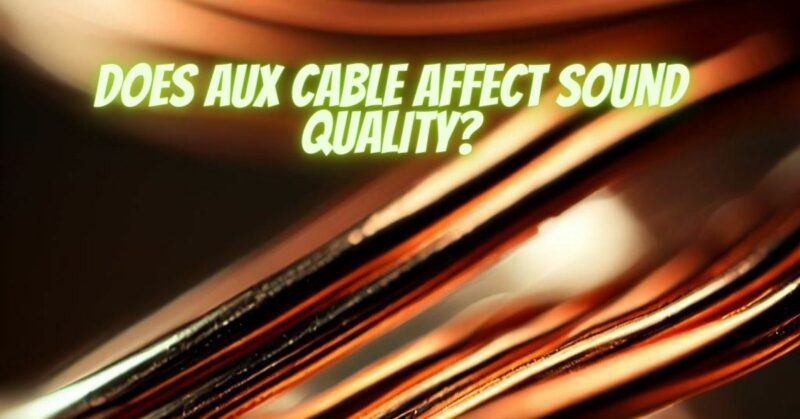Auxiliary (aux) cables have become a ubiquitous accessory for connecting audio devices, such as smartphones, laptops, or MP3 players, to external speakers, headphones, or car audio systems. However, there is often debate regarding the impact of aux cables on sound quality. In this article, we will explore whether aux cables truly affect sound quality and provide insights to help you understand their role in the audio signal chain. Let’s uncover the truth about the influence of aux cables on sound quality!
Signal Transmission:
Aux cables transmit analog audio signals from the source device to the receiving device. They consist of two or three conductors encased in an insulating material and terminated with standard 3.5mm (1/8 inch) connectors. The conductors carry the left and right audio channels (in the case of stereo) and, in some cases, a ground connection.
Cable Quality and Construction:
The construction and quality of an aux cable can have a subtle impact on sound quality. Factors such as the quality of conductors, shielding, and connector materials can affect signal integrity and introduce potential noise or interference.
- Conductors: High-quality aux cables often feature conductors made of oxygen-free copper (OFC) or other high-conductivity materials. These conductors minimize resistance and signal loss, resulting in cleaner audio transmission.
- Shielding: Aux cables with proper shielding help reduce electromagnetic interference (EMI) and radio frequency interference (RFI) that can introduce unwanted noise into the audio signal. Look for cables with good shielding to maintain optimal sound quality, especially in environments with high levels of electrical interference.
- Connector Materials: The quality of the connector materials, such as the plug and jack, can impact durability and long-term performance. Well-made connectors with proper gold or nickel plating provide reliable electrical contact and minimize signal degradation over time.
Length and Interference:
The length of an aux cable can affect its overall performance. Longer cables can introduce more resistance and signal loss due to the increased length of the conductors. It’s generally recommended to keep aux cable lengths as short as possible to minimize these effects.
Additionally, external factors such as nearby power cables, electronic devices, or radio frequency sources can introduce interference or noise into the audio signal. This interference can manifest as hum, buzzing, or static. Proper cable routing and avoiding proximity to these sources can help mitigate such issues.
Perceptible Sound Quality Differences:
In most cases, the impact of a high-quality aux cable on sound quality is often subtle and may not be discernible in everyday listening scenarios. However, under certain conditions, such as critical studio monitoring or high-end audio systems, the use of well-constructed aux cables can contribute to preserving signal integrity and minimizing potential signal degradation.
Conclusion:
While aux cables can play a role in sound quality, their impact is generally subtle. Investing in a well-made aux cable with quality conductors, proper shielding, and reliable connectors can contribute to maintaining optimal signal transmission and minimizing potential interference. However, for typical consumer applications, the difference in sound quality between a decent-quality aux cable and a premium one is unlikely to be noticeable. Focus on selecting a cable that meets your needs in terms of durability, length, and interference prevention, and enjoy your audio experience with confidence.

